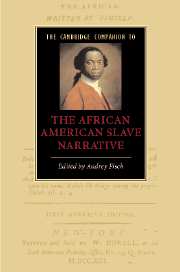Book contents
- Frontmatter
- Introduction
- Part I: The Slave Narrative and Transnational Abolitionism
- Part II: The Slave Narrative and Anglo-American Literary Traditions
- Part III: The Slave Narrative and the African American Literary Tradition
- Part IV: The Slave Narrative and the Politics of Knowledge
- Further Reading
- Index
Introduction
Published online by Cambridge University Press: 28 July 2007
- Frontmatter
- Introduction
- Part I: The Slave Narrative and Transnational Abolitionism
- Part II: The Slave Narrative and Anglo-American Literary Traditions
- Part III: The Slave Narrative and the African American Literary Tradition
- Part IV: The Slave Narrative and the Politics of Knowledge
- Further Reading
- Index
Summary
It wasn't until the very end of my education that I first read a slave narrative. Growing up in Rochester, New York, once an abolitionist stronghold, I knew about slavery and encountered evidence of it both in the classroom and the community. I vividly remember being taken as a small child to see a hidden room in a local restaurant which was a “stop” on the Underground Railroad. But I never read or was asked to read a slave narrative until the end of my coursework in graduate school.
My experience was not unique. In the not-so-distant past, few students read slave narratives in secondary school, in universities, or even in graduate school. For a variety of reasons, including political change caused by the Civil Rights movement, the steadfast work of many devoted scholars, and a radical shift in notions of what literature is and why we read it, the value of the slave narrative has multiplied exponentially. Today, students at every level are likely to encounter these narratives of slavery, escape, and freedom written by fugitives of British colonial and American slavery in a wide range of courses.
Indeed, the existence of this volume is a testament to that sea change. Volumes in the Cambridge Companion series offer what Cambridge University Press describes as “lively, accessible introductions to major writers, artists, philosophers, topics and periods.” The publication of this Companion confirms that the African American slave narrative is now recognized as a “major” genre, firmly established in the academic canon of what should be read and studied.
- Type
- Chapter
- Information
- Publisher: Cambridge University PressPrint publication year: 2007
- 2
- Cited by

